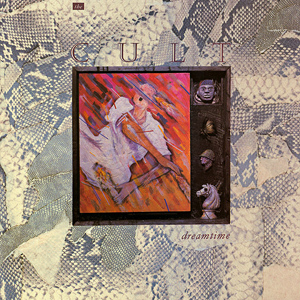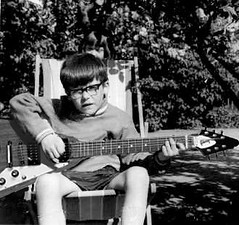Friday, July 25, 2008
HOW ABOUT JUST, 'THE CULT'?
Ian Astbury formed Southern Death Cult in the Post-Punk climate of Britain, 1981, and along with Bauhaus and Sisters of Mercy (among others), helped define what has become known as Goth.
Southern Death Cult lasted a cozy year and a half before disbanding. Then Ian met guitarist Billy Duffy, and formed Death Cult.

After releasing a self titled EP in 1983, the band dropped the 'death' in an effort to garner a broader appeal.

A year later the band emerged from Rockfield Studios in Wales with the 'Dreamtime' record. Duffy's highly processed guitars and Astbury's developing powerhouse vocal style carry the record which suffers from less than great production. The frequent lyrical references to American Indian culture on 'Dreamtime' coupled with the resonant tenor quality of Astbury's voice inevitably conjure up a Jim Morrison vibe that he has done little to distance himself from, and much to exploit.

In 1985 a much more well defined and focused LP, 'Love', was released, containing the band's breakthrough single, 'She Sells Sanctuary'. Not entirely devoid of their Post-Punk roots, on 'Love' The Cult favor a more Psychedelic sound courtesy of Billy Duffy's penchant for signal processing, and the much improved production provided by Steve Brown.
To date, The Cult had developed their sound steadily and a clear direction, each ensuing release a more mature, more evolved take on the same sonic idea, that of layers, effects, and lots of whooshy-whoosy. In 1986 they took a fork in the road, a fork that lead to a complete overhaul of their sound.
Initially The Cult began work on their next album with Steve Brown, but after tracking had wrapped, they weren't happy with the sound. They asked the then up and coming producer Rick Rubin to remix the record. Rubin, who at that point had produced three records: LL Cool J's 'Radio', the Beastie Boys 'Licence To Ill', and Slayer's masterwork 'Reign In Blood', demanded that they re-record the album with him at the helm.
The first thing Rick Rubin did was to take away all of Billy Duffy's effects pedals. He stripped the band's sound down to highlight the great Duffy riffs that were buried in the heavy application of whooshy-whoosh.

The result was 'Electric', a decidedly Hard Rock record wherein The Cult completely abandoned the Post-Punk and Psychedelia, and totally embraced the Big Guitar sound of, well, AC/DC basically. Rick Rubin made a Mutt Lang Hard Rock record while Mutt was busy making Pop stars out of the formerly Hard Rock band Def Leppard.
'Electric' was refreshing in it's blatant derivative-ness. The Cult gave us the Hard Rock that the Hard Rock bands had stopped giving us, and they found a very receptive audience for it. That was fortunate for the band, as the new direction was a veritable slap in the face to the Goths and Punks who had supported them up to that point.
With the success of the single 'Love Removal Machine', and the support of MTV, 'Electric' established The Cult in America. A world tour followed, and the band gained a Zepplinesque reputation for tour behaviour.

Producer Bob Rock was brought in for 1989's 'Sonic Temple', and Bob let Billy have some of his toys back, though the lesson was learned, and the focus on Big Riffs remained. 'Sonic Temple' launched four singles, including 'Fire Woman', and 'Edie (Ciao Baby)', and launched The Cult to the top of the Rock heap - a difficult place to keep a foothold.
The lack-lustre 'Ceremony' followed. Astbury and Duffy were at odds. The magic was gone, and the ensuing records consistently failed to measure up. By the mid 90's the band was on hiatus, and Astbury engaged in some side projects. A brief reunion, complete with sub-standard album, came and went, and then Astbury left to join the Doors.
The Cult has recently reformed again. I'm not sure I care.
Ian Astbury formed Southern Death Cult in the Post-Punk climate of Britain, 1981, and along with Bauhaus and Sisters of Mercy (among others), helped define what has become known as Goth.
Southern Death Cult lasted a cozy year and a half before disbanding. Then Ian met guitarist Billy Duffy, and formed Death Cult.

After releasing a self titled EP in 1983, the band dropped the 'death' in an effort to garner a broader appeal.

A year later the band emerged from Rockfield Studios in Wales with the 'Dreamtime' record. Duffy's highly processed guitars and Astbury's developing powerhouse vocal style carry the record which suffers from less than great production. The frequent lyrical references to American Indian culture on 'Dreamtime' coupled with the resonant tenor quality of Astbury's voice inevitably conjure up a Jim Morrison vibe that he has done little to distance himself from, and much to exploit.

In 1985 a much more well defined and focused LP, 'Love', was released, containing the band's breakthrough single, 'She Sells Sanctuary'. Not entirely devoid of their Post-Punk roots, on 'Love' The Cult favor a more Psychedelic sound courtesy of Billy Duffy's penchant for signal processing, and the much improved production provided by Steve Brown.
To date, The Cult had developed their sound steadily and a clear direction, each ensuing release a more mature, more evolved take on the same sonic idea, that of layers, effects, and lots of whooshy-whoosy. In 1986 they took a fork in the road, a fork that lead to a complete overhaul of their sound.
Initially The Cult began work on their next album with Steve Brown, but after tracking had wrapped, they weren't happy with the sound. They asked the then up and coming producer Rick Rubin to remix the record. Rubin, who at that point had produced three records: LL Cool J's 'Radio', the Beastie Boys 'Licence To Ill', and Slayer's masterwork 'Reign In Blood', demanded that they re-record the album with him at the helm.
The first thing Rick Rubin did was to take away all of Billy Duffy's effects pedals. He stripped the band's sound down to highlight the great Duffy riffs that were buried in the heavy application of whooshy-whoosh.

The result was 'Electric', a decidedly Hard Rock record wherein The Cult completely abandoned the Post-Punk and Psychedelia, and totally embraced the Big Guitar sound of, well, AC/DC basically. Rick Rubin made a Mutt Lang Hard Rock record while Mutt was busy making Pop stars out of the formerly Hard Rock band Def Leppard.
'Electric' was refreshing in it's blatant derivative-ness. The Cult gave us the Hard Rock that the Hard Rock bands had stopped giving us, and they found a very receptive audience for it. That was fortunate for the band, as the new direction was a veritable slap in the face to the Goths and Punks who had supported them up to that point.
With the success of the single 'Love Removal Machine', and the support of MTV, 'Electric' established The Cult in America. A world tour followed, and the band gained a Zepplinesque reputation for tour behaviour.

Producer Bob Rock was brought in for 1989's 'Sonic Temple', and Bob let Billy have some of his toys back, though the lesson was learned, and the focus on Big Riffs remained. 'Sonic Temple' launched four singles, including 'Fire Woman', and 'Edie (Ciao Baby)', and launched The Cult to the top of the Rock heap - a difficult place to keep a foothold.
The lack-lustre 'Ceremony' followed. Astbury and Duffy were at odds. The magic was gone, and the ensuing records consistently failed to measure up. By the mid 90's the band was on hiatus, and Astbury engaged in some side projects. A brief reunion, complete with sub-standard album, came and went, and then Astbury left to join the Doors.
The Cult has recently reformed again. I'm not sure I care.
Comments:
I'll always have a special place in my heart for The Cult. I always really enjoyed the b-sides from the singles. But I think that Andrew Eldritch would take exception to your goth comment. ;-) He always seemed to hate to be lumped into that. In fact, the one time I saw SOM, he was dressed in all white. Of course I would have lumped them into goth rock.
I think Andrew Eldritch would take exception to most anything anyone said about the Sisters outside of absolute praise.
For those interested, and I'm surprised Hazmat didn't bring it up, the original mixes of 'Elecric' prior to Rubin's involvement can be found on 'The Manor Sessions'.
Yeah, I love the Manor Sessions stuff. More is on the "Peace" album, as it was originally going to be called, from the box set.
Post a Comment

